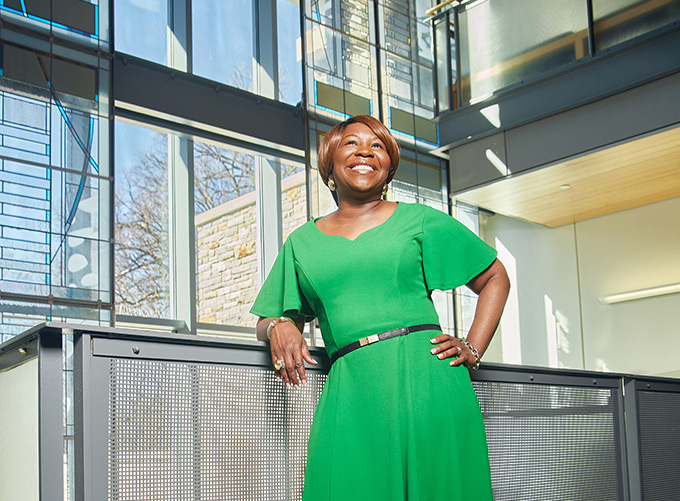Kimberly Ellison-Taylor, MBA ’96, says Loyola helped her bring all of the pieces together
One of the most powerful women in accounting remains focused on giving back
Melissa Leddy & Jessica Goldstein
 Photo credit: Tyrone Wilkens
Photo credit: Tyrone Wilkens
When Kimberly Ellison-Taylor, MBA ’96, was in third grade, a presentation on careers at school changed her life. Ellison-Taylor remembers hearing for the first time that “accountants manage the money.” That was the day she realized the role an accountant could play—and she knew she wanted to be a Certified Public Accountant.
Ellison-Taylor knew she’d need the credentials to match her career aspirations. So, after completing an undergraduate degree at the University of Maryland, Baltimore County, the Baltimore City native chose to pursue her MBA at Loyola University Maryland. Ellison-Taylor found Loyola to be a natural fit for her as a student, due to the Jesuit value of cura personalis, or care for the whole person.
“My intellectual self, spiritual self, moral self—all my pieces of self—show up in everything I do,” she explains.
Loyola’s MBA program helped Ellison-Taylor, who currently lives in Bowie, Maryland, see how she could fuse her faith into her academic journey.
“I had faculty who challenged us to think about all aspects of what would be considered a ‘successful’ business,” she remembers. “It’s not just about profit. It’s also about people, society, justice.”
As a woman of color and a non-Catholic from a different socioeconomic background than many of her business school classmates at that time, Ellison-Taylor calls herself “as different as different could be.” She could offer diverse perspectives that needed to be considered in business-related decision-making.
“People were willing to listen to me, and I felt empowered to speak my truth in our class discussions,” she says.
Over the decades, Ellison-Taylor's career has blossomed. Today she serves as CEO for her own consulting firm, KET Solutions LLC, which focuses on business growth, innovation, strategy, transformation, and inclusive leadership. Ellison-Taylor has served on Loyola’s Board of Trustees since 2021 and remains engaged with the Rizzo Career Center and Sellinger School of Business as an event guest speaker and mentor.
She is an adjunct professor at Carnegie Mellon University, where she completed a master’s degree in information technology management; and she serves as a keynote speaker on topics ranging from emerging technology and innovation to inclusive leadership.
In 2016, Ellison-Taylor became the 104th Chairman of the American Institute of CPAs (AICPA), the first Marylander, fifth woman, and the first person of color to serve as the volunteer leader for the world’s largest accountancy body. Subsequently, her passion for innovation and next gen leaders have earned Ellison-Taylor a reoccurring place among Accounting Today’s Top 100 Most Influential People in Public Accounting and CPA Practice Advisor’s Top 25 Most Powerful Women in Accounting.
“As a CPA, my responsibility is also to promote and protect the public’s interest. You take on that charge,” she adds, “and there’s no other background that is better-suited to that than a Jesuit education. My Loyola education aligned my heart and head and reinforced that people are the most critical component of an organization. Paying it forward is my honor and obligation.”
Ellison-Taylor is an avid volunteer within the accounting profession and for community-service organizations, including chairing the National Commission on Diversity and Inclusion for AICPA, chairing the Maryland Association of CPAs Foundation, and serving as immediate past president of Beta Alpha Psi, the international honor organization for financial information students and professionals.
Ellison-Taylor believes Loyola enabled her to become the person she is today.
“My Loyola MBA told me that I could have all these things integrated to my whole self: I can do the right thing, I can act with integrity, I can lead with a service mindset, and I can be successful in corporate America. To whom much is given, much is required.”